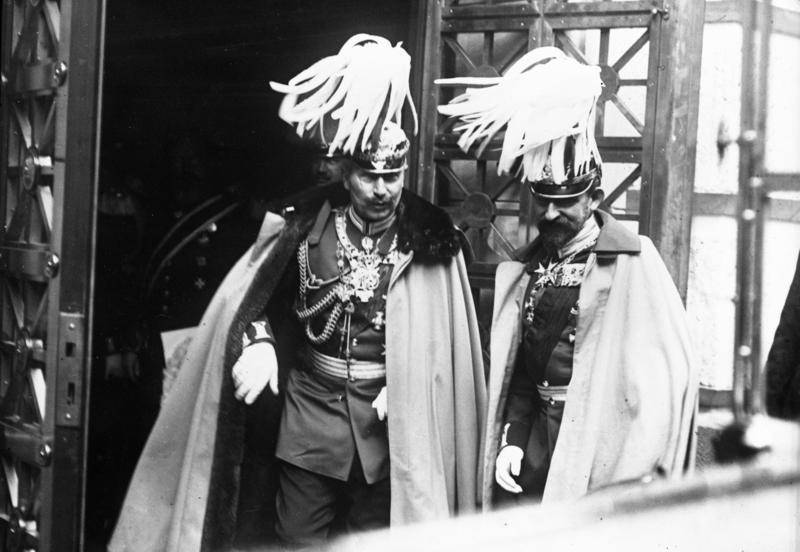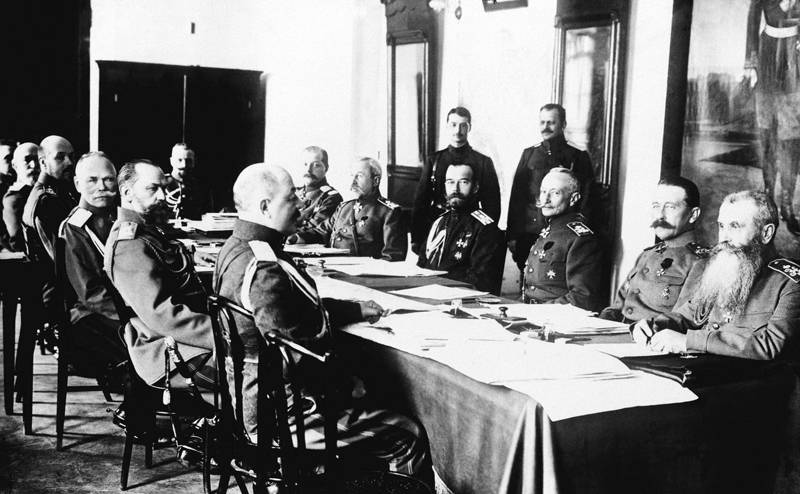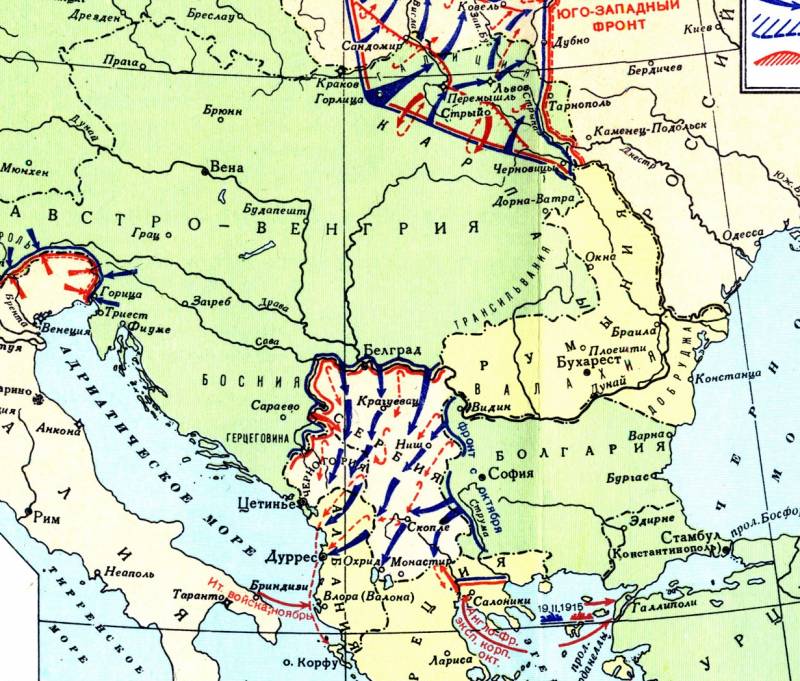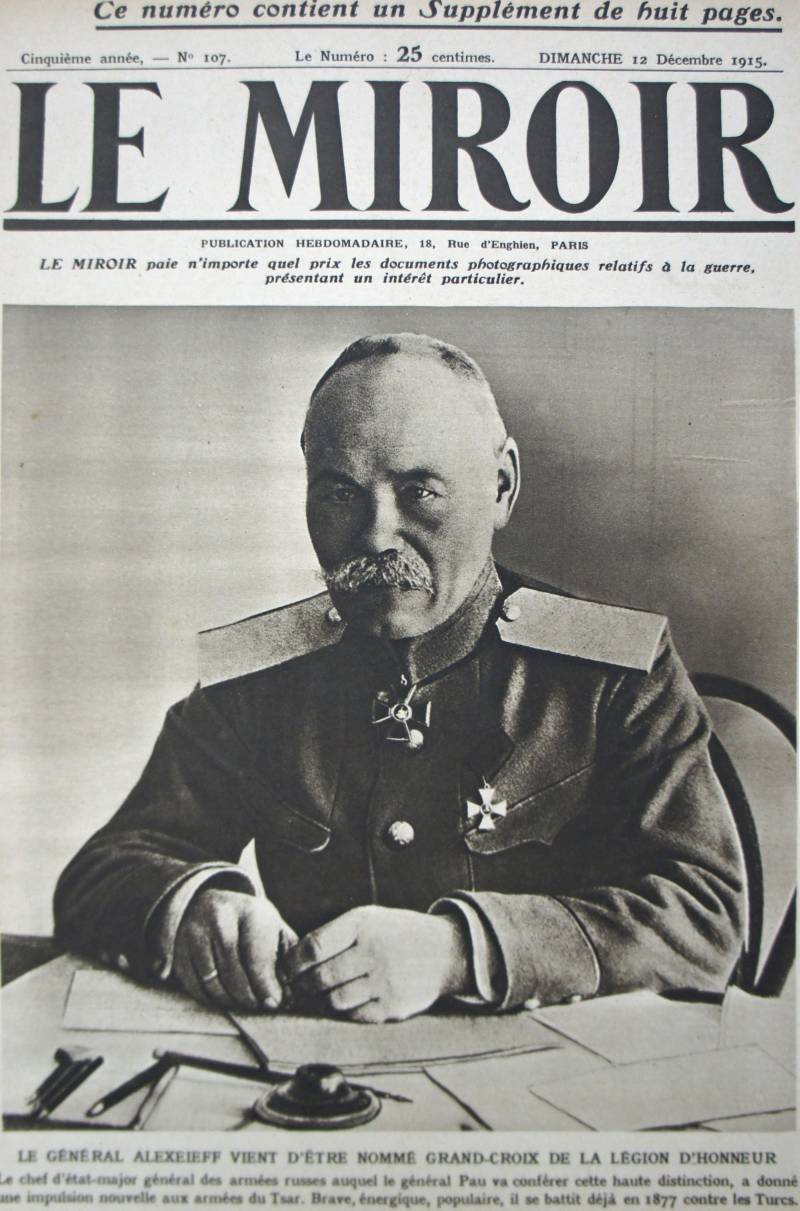Romania in the WWI. Unfulfilled opportunities
Romania with 1883 was linked to Austria and Germany by an alliance treaty. In the German General Staff seriously counted on the Romanian divisions. Planning to abandon their main forces to the west at the beginning of the war, the Germans believed that the Austrians, together with the Romanians, would be able to pin down the Russian army in the east. With the beginning of the war, Vienna and Berlin demanded to speak with them. For the immediate performance on the Austro-German side was the Romanian king Karl Hohenzollern. In Russia, they feared that the king might organize provocations on the Russian-Romanian border in order to draw Romania into the war on the side of the enemy.

Karl (right) and Kaiser Wilhelm.
But the performance of the Romanians in 1914 on the side of the central block could bring not only negative consequences for Russia and the Entente in general. Romanians could not forge many Russian troops. But to get a crushing answer is yes. At the beginning of 1915, instead of a heavy offensive in the Carpathians against the rested Austro-Hungarians, the Russian army could strike at the Romanians - the weakest member of the enemy coalition. In addition, the performance of Romania against Russia automatically put Bulgaria in the Russian allies. She had a vital interest in this — the return of the southern Dobrudja, captured by the Romanians. So, the Romanians fell into ticks from the north and south. And then, through the territory of Bulgaria, the Russian army was close to Constantinople and the Black Sea straits.
In fact, the performance of Romania on the side of Austria-Germany, and even at the very beginning of the war, was excluded. The pro-German position of the king had no support in society and the ruling elite. The majority believed that fighting for Austria-Germany was not in the interests of Romania. The defining position was that of Bratian, to wait for the winner to be clearly identified in the war - and to speak on his side by the end of the war. In the meantime, Bucharest has declared itself neutral; the Austro-German demand to act on their side was rejected. Formally, according to the contract, it was required that Russia be the attacking side, but after all, Austria and Germany began the war. In September, the old Germannofil king 1914 died. The new king did not try to push through some of his own line.
The Romanians for the most part wanted the Entente to be the winning side. The Entente, seeing such a predisposition, made efforts to attract Romania to its side. In particular, the claims of Romanians to Transylvania were recognized. Among the considerations of the Russian command, who threw their troops into the bloody Carpathian operation, not the last was to persuade Rumania to launch.
In Romania itself, supporters of the Entente began a noisy campaign for the quickest possible entry of Romania into the war. By the spring of 1915, their campaign was at its peak. Brian began to hint that the Romanians will perform in the spring. And this time was really suitable for performance. The situation was quite favorable: Bulgaria had not yet entered the war against the Entente, the Russian front was held in the Carpathians, the Serbian front was holding out, Italy was entering the war over the Entente. And Transylvania was very weakly covered.
The Romanian performance could have confused all the cards in the Austro-German headquarters. On April 19 (2 May BC), an offensive was launched on the Russian front near Gorlitsy. There is already concentrated shock group under the command of Mackensen. Austro-Germans waited for success - they would break through the front and force the Russian armies to the Great Retreat. Leaving the enemy of large territory and huge losses will be a heavy shock for the Russian army, the ruling circles and society.
The Romanian offensive threatened not only the loss of Transylvania. It saw a strategic bypass from the southern flank of the entire Eastern Front of Austro-Germans. Their only reserve was the Mackensen grouping. There were no other forces for quick transfer to the threatened direction. The attack near Gorlitsy would have to be canceled. Troops destined for him would go to Transylvania. The Russian army would receive a respite and prepared an offensive on the Carpathian front.
In May, Italy declared the 1915 war against Austria-Hungary. The Austrian command had to transfer 5 divisions from the Serb front and 2 divisions from Galicia to the newly formed front. In total, the Italians forged the 20 Austro-Hungarian divisions. The weakening of the Austro-Hungarians on their front would have taken advantage of the Serbs. Under the blows from all sides, Austria-Hungary could collapse.
On the Romanian territory was the only way by which Germany transported weapon the Turks. With the performance of Romania, these deliveries would be blocked - and the Anglo-French forces would have a chance to reverse the situation in the Dardanelles.
In general, if Romania came out in the spring of 1915, this could change World War I, leading to faster defeat for the central powers. A war would be shorter, less bloody and less destructive for all.
In fact, the rulers of Romania excluded her performance in the spring of 1915. Proponents of immediate accession feared that Romania might be late for the war and would be unnecessary. But Brattianu saw that the war would still be long. Therefore, we must continue the policy of waiting - until more favorable conditions arise. One of those who knew the Romanian prime minister described his position as follows: “We will deceive everyone and enter the war in the end, just to have time for the peace conference as a member of the winning coalition.”
Romanians seem smarter than the Italians. Those after all quickly agreed on everything with the Entente and, having declared war, immediately launched an offensive. But the Italians, entering the war, did not at all expect that they would face heavy fighting. The calculation was that the Austro-Hungarians tightly bound the Russian and Serbian fronts - and against the Italians the Austro-Hungarians already had no one to put up. The Romanians also saw that in the spring of 1915 the Austro-Hungarians still had quite strong reserves. In particular, their counterattacks forced the Russian troops from Bukovina to retreat. Facing a still strong adversary was not part of the calculations of Bucharest.
The script of the Romanian speech in the spring of 1915 implies the salvation of Russia. After all, the fateful grouping of Mackensen would have been distracted by the Romanians. But just this Romanians would never have done. They received information about the German troops that appeared in the Carpathians - not far from Romania itself. This information was particularly bad for the Romanians and their willingness to speak. They were afraid of the German army (yes, everyone was afraid of her). Concentrating their forces at Gorlitsa in the spring of 1915, the Germans completely ruled out the performance of the Romanians. After all, they understood that they would have to fight with these German forces then, and not only Russian ones.
By the end of 1915, the army of the central block defeated Serbia. Freed more 300 000 soldiers, the question arose - where to send them next? Among other things, the project was discussed to strike at the beginning of 1916 in Romania. This was seen as a preemptive strike. Nevertheless, it was decided not to add another front to those already existing. Yes, and the Romanians were in a hurry in this period to take the form of complete loyalty to the central powers.
In May-June, 1916 came another favorable moment for the Romanian entry. Russian troops under the command of Brusilov inflicted a heavy defeat on the Austro-Hungarian armies. In the Hungarian parliament, there were calls for withdrawal from the war. In Bucharest, they were frightened that with their waiting policy they could miss the moment.
The historian A. Kersnovsky wrote: if the Romanians had acted right away, then “the position of the Austro-German armies would be catastrophic from the critical one, and with skillful use of the Romanian capabilities, we would be able to disable Austria-Hungary.” But Brian would not be Brian, if he hadn’t saved that moment either. Instead of an immediate speech, he again delayed the negotiations. In Bucharest did not see the need for immediate intervention. Nor have they seen it in Petersburg - otherwise the Romanians would accept all the demands (not intending to fulfill them later - in the spirit of Anglo-French diplomacy) - if only the Romanians would act faster.
In addition to diplomatic discrepancies, Kersnovsky adds to the Romanians one more reason to postpone the performance - they had to sell the Austro-Germans all that was still possible and then go to war with them. So, even the cunning of Petersburg would not have accelerated the Romanians. But, if in May-June the Austro-Germans did not know how to plug holes on the Russian front, then by September they already had something to transfer against the Romanians. The Romanians were quickly defeated.
The Romanian disaster affected not only Romanians. The whole weight of the collapsed Romanian front had to be shouldered by the Russian army. With heavy casualties, she attacked Austro-Hungarians in the Carpathians in order to draw their forces to themselves, easing the position of the Romanian ally. From other sites, 36 infantry and 13 cavalry divisions were removed and transferred to Romania — more than 500 000 fighters, a quarter of the forces of the Russian army. An emergency transportation of a huge number of troops subjected Russian railways to heavy stress. There is an opinion that it was Romanian transportation that completed the breakdown of the Russian railway sector at the beginning of 1917. Because of this frustration, there were interruptions in the supply of St. Petersburg - which caused the demonstrations that turned into a revolution.
Of course, the Romanians themselves are to blame for their catastrophe. But not only. A. Kersnovsky notes that the Russian command was able to prevent a catastrophe, but missed them.
In general, the Russian command, headed by Alekseev, was against the involvement of Romania in the war. It was clear that Romania could put up a weakly armed and inexperienced army, not provided with any ammunition or other types of equipment. The security was supposed to go at the expense of the Russian side. In general, a weak ally will bring more problems rather than help.
In addition, the Romanians arranged their performance with unacceptable requirements for Russia. Their claim to Transylvania and other lands with a Romanian majority was recognized. But Bucharest solicited more - even the Ukrainian and Serbian lands. The approach of the Anglo-Franks here was this: to agree to all the demands of the Romanians, to promise them everything, just to drag them into the war. It’s just that they didn’t intend to fulfill their promises later, and it’s not their promise. It was agreed after the war to see what the Romanians really could reveal. The approach of Russia was different - after all, the demands of the Romanians touched it immediately and directly. Among other things, Romania demanded the sending of Russian troops to Dobrogea - against the Bulgarians. But a direct clash with the Bulgarian troops was undesirable for Russia.
Romania requested to send 5-6 Russian buildings, approximately 250 000 people. Alekseev categorically rejected this "monstrous harassment." He promised 50 thousands, but he felt sorry for them, sending 30 thousands. Such forces could not do anything against the beginning of the offensive of the central armies. But 250 000 could, together with the Romanians, repel the offensive of a common enemy. Then, under the pressure of the ensuing catastrophe, the Russian headquarters was forced to rush to Romania much more troops.
The duty of General Alekseev was not to reject "harassment", but to foresee the possibility of catastrophic development, if not support the Romanians in advance. To foresee that their catastrophe will inevitably affect Russia. The interests of Russia demanded not ranting that he, de, would not be engaged in "dragging chestnuts for the Romanians with Russian hands." Russia's interests demanded the use of opportunities that arose with the accession of Romania.
From Romania it was possible to strike around the flank of the entire Austro-German front. The Russian Stavk had to immediately and substantially reinforce the Romanians and coordinate with them the direction of their main attack - from Moldova to the northeast. Already at the beginning of the offensive, it was possible to reach the rear of the Austro-Hungarian armies and intercept the few Carpathian passages there, catch the Austro-Hungarians in a bag.
There was another strategic opportunity: to strike from Romania to the south - on Bulgaria. Such an opportunity was seen and feared by Hindenburg and Konrad, the commanders-in-chief of the enemy. She saw and the head of the Russian strategy Alekseev. At the beginning of 1916, he himself put forward such an idea: the Romanians and Russians from the north, the Allied army of the Allies from the south, jointly took Bulgaria into ticks and took it out of the war, then liberated Serbia. Turkey cut off the same way. And then the combined forces of the Entente attacked from the Balkans to the north.
However, the Western Allies did not agree on an offensive from the south and north. They energetically encouraged Romania to speak, but at the critical moment they did not help her. The Salonika army of General Sarrail spent in idle time when the Russian army was bleeding in the Carpathians, trying to pull the enemy away from the Romanians.
And the Romanians themselves would hardly have willingly agreed to a strategy. They clearly did not want to advance to the northeast or south - to the place where it smelled of roast, where they had to face a serious clash with the enemy. They were concerned only with the occupation of the weakly protected Transylvania.
But, if Russia provided Romanians with strong support, then it could require agreement on plans. In exchange for sending Russian troops, Romania had to strike from Moldova to the north - in the flank and rear of the Austro-Hungarians on the Russian front. Here the Romanians were supposed to concentrate their main forces, no less than 250 000 bayonets. It was necessary to convince the Romanians: it is pointless to attack somewhere in Transylvania, isolated from the main eastern front.

But the Russian General Headquarters wanted to see in the statement of Romania not opportunities, but only disadvantages, like stretching an already huge front. Alekseev was against the entry of Romania. And when they still imposed a Romanian ally on him, the general took an indifferently ignoring position towards him. Russian Stake has stepped back from any participation in the development of the Romanian strategy. Left to themselves Romanians ordered very badly.
The entry of Romania gave the Russian Stavka possible keys to victory. An offensive from the Moldavian Carpathians or Dobrudja could have been strategically successful. But the flank position of Romania was never realized. The rate chose to continue the bloody and already fruitless offensive in Galicia. Alekseev regretted for the Romanian 5 front of the Russian corps in August 1916. In December, I had to send 15 cases, but without any benefit. Russia and the Russian army cost him much thoughtlessness.
It was necessary either to resolutely back up the Romanians immediately, or not to allow their entry at all. The Russian General Staff and the government with the Foreign Ministry resisted their entry - it was necessary to be more stubborn. If you could achieve non-entry - it would be better for everyone.
Indeed, in fact, the entry of Romania only prolonged the war - contrary to the hopes of Paris and London, which pushed the Romanians to join. A quick and shattering victory over Romania raised the despondent spirit of the peoples of the central bloc. Germany strengthened confidence in the ultimate victory. In occupied Romania, the Germans pumped a million tons of oil, requisitioned two million tons of grain. Both the uplifted spirit and the material resources received were vital for Germany to continue the war until the fall of 1918.
In modern Romania, there is also an opinion: it was better not to get involved in 1916 in a war that cost the hardest losses, but to maintain neutrality. Austria-Hungary still waited for the collapse and collapse - in 1918 the Romanians would have taken Transylvania without a war, without losing a single soldier, without suffering any ruin. Perhaps it would also be with Russia and Bessarabia.
That's just the 1916 Romanians really wanted to enter the war, because they then did not foresee the serious consequences of this. To keep them from joining could only counter this Russia. But the Anglo-Franks pushed through the entry of Romania, and the Russian side could not withstand their pressure. In relations between Paris, London and St. Petersburg was dependent. Yes, and the Russian command was somewhat relaxed after Brusilov’s success. Austro-Germans no longer expected the ability to respond quickly to Romanians. There was also a false hope that the Bulgarians were shackled in the south by the Allied Thessaloniki Front. Therefore, the Romanians do not come in, and they don’t need support ... As in the spring of 1915, Stavka and Petersburg assessed the situation with confidence, not suspecting that a catastrophic turn was already a few steps away.
In general, the disaster was inevitable.


Information